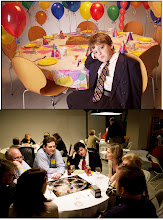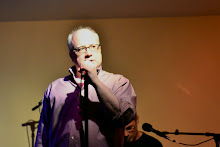I just noticed today that the three leading Republican candidates are:
1. A patrician, stilted, flip-flopping former governor of Massachusetts
2. A surging former governor of Arkansas
3. A pro-gay, anti-gun, pro-choice former mayor of New York City
Isn't that supposed to be the Democrats? (Not that any of these guys looks remotely like a Democrat.) Last time we had a surging former governor of Arkansas in the news, he got impeached for it.
Also, the fact that Romney felt he had to give that speech that he really is a Christian disheartens me. All of our candidates (on either/any side) must fit such a narrow set of criteria.
No fair that my son's blog is better than mine.
Friday, December 7, 2007
Subscribe to:
Post Comments (Atom)




11 comments:
As I recall, the Republicans tried to impeach Clinton for lying about getting a "blow-job". Why haven't we impeached this idiot for lying about WMD's, starting this war in Iraq,and a "blown" job?
I think that many of our founding fathers were actually agnostic, if not downright atheist.
If our forebears had been particularly religious, most likely they would have insisted on a state religion.
What a turn-around little more than 200 years later. Can you imagine someone running for president espousing a doubt that there even is a god?
I think Gail Collins has been reading our blog entries:
http://www.nytimes.com/2007/12/08/opinion/08collins.html?_r=1&th&emc=th&oref=slogin
If you don't have an account at the nytimes.com, open one up. It's easy and free. And the best part, you don't have to pay a fee to get to the good stuff (e.g., the op-ed articles), like you used to.
No doubt Gail has our blogs bookmarked as one of her favorites.
Well, Rob, you pulled me in on this one...not to get into a battle with you (or family members)
I suggest reading the following site for information the religious background of our founding fathers.
www.adherents.com/gov/Founding_Fathers_Religion.html
On the comment about Romney's speech - why do democrats get their panties in a wad whenever any judeo-christian belief is brought to the forefront but LIFT UP any other controversial religions? Most religions are intolerant and promote an us vs. them mentality -as do democrats and republicans. These blogs on politics have a bit of that flavor. I would be much more interested in learning more about the "other side" if I didn't sense such hostility.
As always though --- I love you too much....oh yeah, Merry Christmas..
Sarah, thanks for posting, and also thanks for sharing Taylor's blog. It will be a must-read for me.
Not sure I agree with the assertion that Dems "lift up" other controversial religions. Even conservative columnists have critiqued the contents of Romney's speech (see, e.g., David Brooks, whom I have taken a little minor teasing for admitting that I read from some quarters). He did not react in shock, horror, disgust, but he admitted it gave him some pause.
I am not an expert in the general religious beliefs of the founding fathers. No doubt that they all did in fact have religious affiliations, and I'm sure most were in fact church leaders. However, I note in the site you gave that Thomas Jefferson is shown as Episcopalian. Jefferson as well may have been a church leader, for all I know (I suspect he was at various times in his life). But I also know he in fact had some fairly radical theologic ideas (e.g., the so-called "Jefferson Bible" that he created). I think his thinking was on the fringe, and I'm not sure some of the very conservative religious/politcal movements would consider and embrace him a "good Christian" based on his actual beliefs.
Maybe you better focus on my music posts! :) Love you, too.
PS--on re-reading the last post, I realize how many times I said "in fact"--in fact, too many times. And that's a fact!
I have no doubt that the early Americans by and large were Christians, studied their bibles, went to church, and tried to live their lives according the the teachings of Jesus. In fact, I hope that I could describe myself that way, except I would have to be studying the bible a lot more to include that bit in good conscience. But whether or no the founding fathers had a firm and abiding belief in God, Christianity and Jesus, it is clear that our political leaders were not to be put to some test of their faith in order to be elected to lead the nation.
The Oxford University Press has this to say about David L. Holms’ book entitled: The Faiths of the Founding Fathers (hardback published March 2006)
“It is not uncommon to hear Christians argue that America was founded as a Christian nation. But how true is this claim?
In his book, David L. Holmes offers a clear, concise and illuminating look at the spiritual beliefs of our founding fathers. He begins with an informative account of the religious culture of the late colonial era, surveying the religious groups in each colony. In particular, he sheds light on the various forms of Deism that flourished in America, highlighting the profound influence this intellectual movement had on the founding generation. Holmes then examines the individual beliefs of a variety of men and women who loom large in our national history. He finds that some, like Martha Washington, Samuel Adams, John Jay, Patrick Henry, and Thomas Jefferson's daughters, held orthodox Christian views. But many of the most influential figures, including Benjamin Franklin, George Washington, John and Abigail Adams, Jefferson, James and Dolley Madison, and James Monroe, were believers of a different stripe. Respectful of Christianity, they admired the ethics of Jesus, and believed that religion could play a beneficial role in society. But they tended to deny the divinity of Christ, and a few seem to have been agnostic about the very existence of God. Although the founding fathers were religious men, Holmes shows that it was a faith quite unlike the Christianity of today's evangelicals. Holmes concludes by examining the role of religion in the lives of the presidents since World War II and by reflecting on the evangelical resurgence that helped fuel the reelection of George W. Bush.
An intriguing look at a neglected aspect of our history, the book will appeal to American history buffs as well as to anyone concerned about the role of religion in American culture.”
I confess, a candidate’s religion matters to me – in that he or she will not impose it on me.
Wow! I guess I should take to heart the adage to not discuss politics, religion and sex when I'm outnumbered...the Endicott family is not to be trifled with on at least the first two taboos. Rob - you and I, however, have had many discussions about sex without incident!! Maybe we should stick to that - and of course, your music blogs.
Now all we need to do is get Taylor to post on this one. (Taylor?)
We are a curious lot, us Endicotts, I will admit. But we love a good discussion of politics--I would say respectful (hopefully), but there is a bare-knuckle element to it underneath it all. (I think Matt Farmer must be a long-lost Endicott.)
Hey, maybe THAT's the real reason why I like ol' Bill Clinton better than W: instead of combining religion with politics, he combined sex with politics! Now if we could only get a rabid Dem/Cardinal fan as a candidate, I'd be really happy.
Saw David Ignatius's column today in the Washington Post--worth a read for anyone interested in this topic.
http://www.washingtonpost.com/wp-dyn/content/article/2007/12/26/AR2007122601486.html
Post a Comment